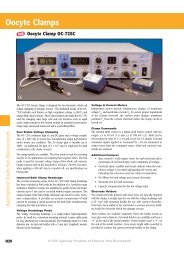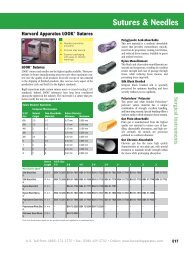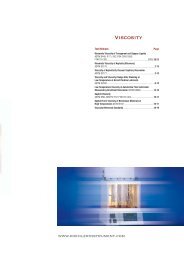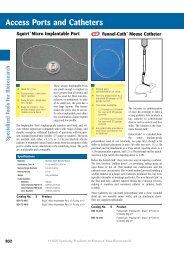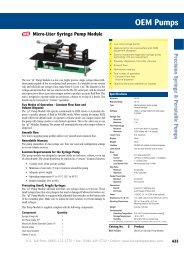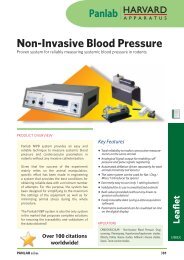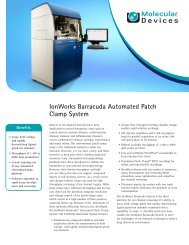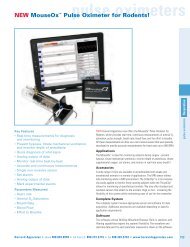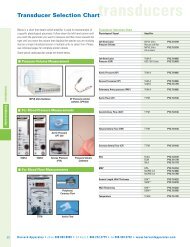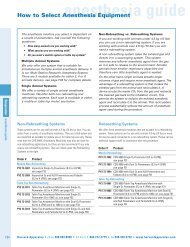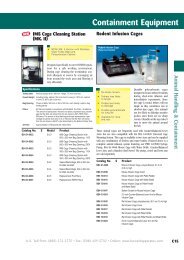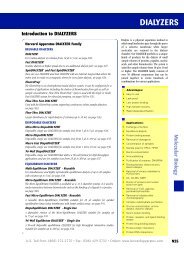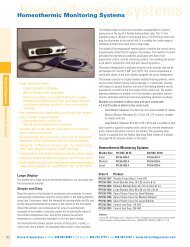General Test Equipment
General Test Equipment
General Test Equipment
You also want an ePaper? Increase the reach of your titles
YUMPU automatically turns print PDFs into web optimized ePapers that Google loves.
Automatic Flocculation Titrimeter<br />
<strong>Test</strong> Method<br />
Samples of asphalt or heavy oil, or residuum are dissolved in toluene at<br />
various concentrations and titrated with iso-octane or n-heptane at<br />
controlled temperatures to determine the point of flocculation (asphaltene<br />
precipitation) and calculate the Heithaus compatibility parameters. These<br />
results are intended primarily as a laboratory diagnostic tool for estimating<br />
the colloidal stability or compatibility of asphalt, asphalt cross blends, aged<br />
asphalt, pyrolyzed asphalt, crudes, and heavy oil (residuum). The stability<br />
values will allow the refiner to increase yields by allowing longer retention<br />
time in process. The compatibility values will allow blending of crudes so<br />
as to prevent asphaltene formation during blending and storage. Both of<br />
these parameters are of utmost importance when we consider the price of<br />
crude in today's market.<br />
Automated Flocculation Titrimeter<br />
• Complete instrument and data acquisition system<br />
• Rapid, accurate and highly reproducible<br />
• Determines blending insolubility and solubility numbers<br />
• Generates the data to calculate the WRI Coking Index (patent pending) to<br />
predict the proximity to coke formation during heavy oil distillation and<br />
improve distillate yield<br />
The Automated Flocculation Titrimeter (AFT) is a highly automated, computerized<br />
instrument that acquires oil stability and compatibility parameters<br />
directly. The AFT can be used to perform ASTM D6703 test method for<br />
Automated Heithaus Titrimetry. The instrument operates as a closed system<br />
with accurately controlled temperatures between 20-100°C, important for<br />
properly determining Heithaus compatibility parameters. The flocculation<br />
point is determined spectroscopically and the results are analyzed by the data<br />
acquisition system, virtually eliminating operator error in the interpretation<br />
of endpoints. A key benefit to the user is the fact that the asphaltene<br />
concentration can be calculated by the software much faster that tradition<br />
methods and with more accuracy. The utility of the original Heithaus method<br />
has been expanded by developing multiple titration schemes. The software<br />
uses the data from the expanded method to predict the proximity to coke<br />
formation during heavy oil distillation. Many refiners stop distillation short of<br />
coke formation to avoid fouling in distillation equipment, tanks and transfer<br />
lines. The expanded AFT methodology allows the refiner to recover additional<br />
distillate without the fear of fouling. This attribute of the instrument should<br />
allow an incremental increase in yields if applied to a process. Conversely,<br />
the added benefit of being able to predict coking tendency, would prevent<br />
fouling of the process and thus decrease the use of energy in production as<br />
well as reduce down time due to having to clean vessels after fouling.<br />
One of the primary uses of Heithaus values is to predict the compatibility<br />
(P Index) of which oils and petroleum residua or asphalts can be mixed<br />
together for shipping, processing, or in formulations without causing phase<br />
separation. This is valuable to the refiner, researcher, or asphalt jobber who<br />
supplies petroleum asphalts for highway and roofing applications because it<br />
ensures that compatible asphalt blends are supplied. Incompatible asphalts<br />
show early failure in both applications.<br />
Coking Index (US Patent 6,773,921)-Stability also influences coke<br />
formation in the refining process. Another major use for the AFT is to acquire<br />
the data needed to employ the Coking Index. The Coking Index is a<br />
quantitative measure of the proximity to coking (fouling) during visbreaking,<br />
distillation, transfer and storage of heavy oil. This allows the petroleum refiner<br />
to optimize heavy oil processing and to recover the maximum amount of<br />
distillate, and to stop the processing before fouling occurs.<br />
Solubility Parameter-The solubility parameter at which asphaltenes begin<br />
to precipitate and the solubility parameter of the whole oil can be calculated<br />
from the AFT data.<br />
52<br />
K47100 Automated Flocculation Titrimeter<br />
Specifications<br />
Conforms to the specifications of:<br />
ASTM D6703<br />
Temperature Range: 20 to 100°C<br />
Included Accessories<br />
Computer with Data Acquisition Software<br />
Fiber Optic Spectrometer with Multi-Bandpass Detector<br />
High and Low Flow Rate Metering Pumps<br />
Magnetic Stirring Plates<br />
Circulator<br />
Reaction Vessels<br />
Quartz Flow Cell<br />
Glassware<br />
Thermometer Probes<br />
Shipping Information<br />
Shipping Weight: 40 lbs (18.1kg)<br />
Dimensions: 11 Cu. ft.<br />
Dimensions lxwxh,in.(cm)<br />
Base/Support Assembly: 12x24x36 (30.5x61x91.4)<br />
Catalog No.<br />
K47100<br />
K47190<br />
Ordering Information<br />
Automated Flocculation Titrimeter, 115V 50/60Hz<br />
Automated Flocculation Titrimeter, 230V 50/60Hz<br />
In collaboration with Western Research Institute



